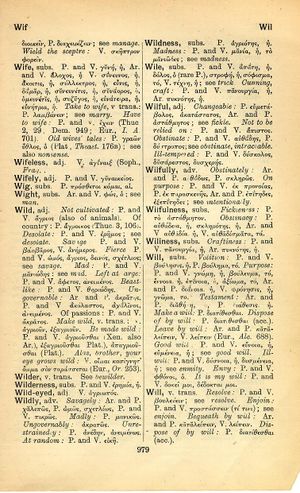wife: Difference between revisions
From LSJ
πᾶσα γυνὴ τοῦ λύχνου ἀρθέντος ἡ αὐτή ἐστι → all women are the same in the dark, all women are the same when the lights go out
(CSV5) |
m (Woodhouse1 replacement) |
||
| Line 1: | Line 1: | ||
{{Woodhouse1 | {{Woodhouse1 | ||
|Text=[[File:woodhouse_979.jpg|thumb|link={{filepath:woodhouse_979.jpg}}]] | |Text=[[File:woodhouse_979.jpg|thumb|link={{filepath:woodhouse_979.jpg}}]] | ||
===substantive=== | |||
P. and V. [[γυνή]], ἡ, Ar. and V. [[ἄλοχος]], ἡ V. [[σύνευνος]], ἡ, ἄκοιτις, ἡ, [[σύλλεκτρος]], ἡ, [[εὖνις]], ἡ, [[δάμαρ]], ἡ, συνευνέτις, ἡ, [[συνάορος]], ἡ, ὁμευνέτις, ἡ, συζυγός, ἡ, εὐνάτειρα, ἡ, εὐνήτρια, ἡ. | [[prose|P.]] and [[verse|V.]] [[γυνή]], ἡ, [[Aristophanes|Ar.]] and [[verse|V.]] [[ἄλοχος]], ἡ [[verse|V.]] [[σύνευνος]], ἡ, [[ἄκοιτις]], ἡ, [[σύλλεκτρος]], ἡ, [[εὖνις]], ἡ, [[δάμαρ]], ἡ, [[συνευνέτις]], ἡ, [[συνάορος]], ἡ, [[ὁμευνέτις]], ἡ, [[συζυγός]], ἡ, [[εὐνάτειρα]], ἡ, [[εὐνήτρια]], ἡ. | ||
[[take to wife]], '''verb transitive''': [[prose|P.]] [[λαμβάνω]], [[λαμβάνειν]]; see [[marry]]. | |||
[[have to wife]]: [[prose|P.]] and [[verse|V.]] [[ἔχειν]] ([[Thucydides|Thuc.]] 2, 29, [[Demosthenes|Dem.]] 949; [[Euripides|Eur.]], ''[[Iphigenia in Aulis]]'' 701). | |||
[[old wives' tales]]: [[prose|P.]] [[γραῶν ὕθλος]], ὁ ([[Plato]], ''[[Theaetetus]]'' 176B); see also [[nonsense]]. | |||
}} | }} | ||
Revision as of 08:51, 20 May 2020
English > Greek (Woodhouse)
substantive
P. and V. γυνή, ἡ, Ar. and V. ἄλοχος, ἡ V. σύνευνος, ἡ, ἄκοιτις, ἡ, σύλλεκτρος, ἡ, εὖνις, ἡ, δάμαρ, ἡ, συνευνέτις, ἡ, συνάορος, ἡ, ὁμευνέτις, ἡ, συζυγός, ἡ, εὐνάτειρα, ἡ, εὐνήτρια, ἡ.
take to wife, verb transitive: P. λαμβάνω, λαμβάνειν; see marry.
have to wife: P. and V. ἔχειν (Thuc. 2, 29, Dem. 949; Eur., Iphigenia in Aulis 701).
old wives' tales: P. γραῶν ὕθλος, ὁ (Plato, Theaetetus 176B); see also nonsense.

